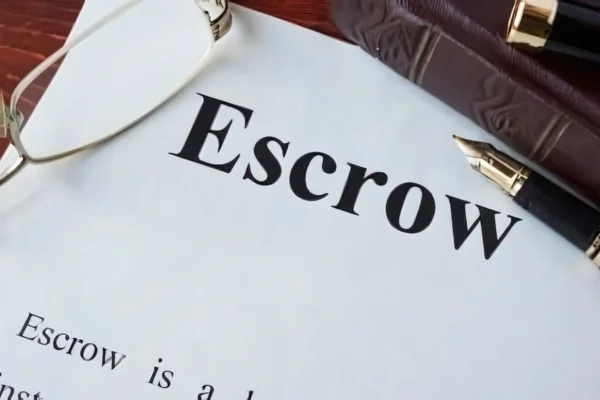Escrow Tips & FAQs

Escrow – What is it?
Very simply defined, an escrow is a deposit of funds, a deed or other instrument by one party for the delivery to another party upon completion of a particular condition or event. The California Escrow Law – Section 17003 of the Financial Code – provides the legal definition.
Why Do I Need an Escrow?
Whether you are the buyer, seller, lender or borrower, you want the assurance that no funds or property will change hands until ALL of the instructions in the transaction have been followed. The escrow holder has the obligation to safeguard the funds and/or documents while they are in the possession of the escrow holder, and to disburse funds and/or convey title only when all provisions of the escrow have been complied with.

How Does Escrow Work?
The principals to the escrow – buyer, seller, lender, borrower – cause escrow instructions, most usually in writing, to be created, signed and delivered to the escrow officer. If a broker is involved, he will normally provide the escrow officer with the information necessary for the preparation of your escrow instructions and documents.
The escrow officer will process the escrow, in accordance with the escrow instructions, and when all conditions required in the escrow can be met or achieved, the escrow will be “closed.” Each escrow, although following a similar pattern, will be different in some respects, as it deals with your property and the transaction at hand.
The duties of an escrow holder include; following the instructions given by the principals and parties to the transaction in a timely manner; handling the funds and/or documents in accordance with the instruction; paying all bills as authorized; responding to authorized requests from the principals; closing the escrow only when all terms funds in accordance with instructions and provide an accounting for same – the Closing or Settlement Statement.
Who Chooses the Escrow Company?
The selection of the escrow holder is normally done by agreement between the principals. If a real estate broker is involved in the transaction, the broker may recommend an escrow holder. However, it is the right of the principals to use an escrow holder who is competent and who is experienced in handling the type of escrow at hand. There are laws that prohibit the payment of referral fees; this affords the consumer the best possible escrow services without any compromise caused by a person receiving a referral fee
What Do I have to do while in Escrow?
The key to any transaction as important as your sale, purchase or loan is to read and understand your escrow instructions. If you do not understand them, you should ask your escrow officer to explain the instructions.
Your escrow officer is not an attorney and cannot practice law; you should consult your lawyer for legal advice. Do not expect your escrow officer to advise you as to whether or not you have a “good deal” or are doing things the right way. The escrow officer is there to follow the instructions given by the principals in the escrow.
In order to expedite the closing of the escrow, you should check with your escrow officer as to what specific items you could do to assist. Ask the question – “What can I do to expedite the closing of this escrow?”
Respond quickly to correspondence. This will assist in the timely closing of the transaction.
If you are required to deliver funds into the escrow, make sure that you provide “good” funds in the form required by the escrow officer. Company procedures differ in this regard, and there are many ways you can help at the time of closing; check with your escrow officer. Do not give the escrow officer a personal check and expect the escrow to close immediately; the escrow can only close on cleared funds, and the processing of a personal check can take days, possibly even a week or more.
When the escrow officer closes the escrow, some of you may want the closing papers, checks, title policies, statements, etc. Made available immediately. There are many aspects to the closing of the escrow, and some of these cannot be processed on the day of the closing; they may take several days. If you have a special need, for example, a cashier’s check on the day of closing, you should communicate that need to the escrow officer early in the processing of the escrow.

What Escrow Can and Can’t Do
The following is a list of the items that we can assist you with:
Prepare escrow instructions based on the information provided by seller, buyer and lender.
Obtain a preliminary title report allowing us to obtain a policy of title insurance for the buyer and lender at close of escrow.
Order hazard disclosure reports.
Order home warranty policy.
Order buyers insurance policy in a form acceptable by the new lender from the company of buyer’s choice.
Order Homeowner Association documents and transfer homeowner association rights to the new buyer, if applicable.
Transfer Water Stock, if applicable.
Process and close the escrow.
The following is a list of the items that we can assist you with:
Seller must order the termite report and have the termite company complete work requirements as per the agreement between the seller and buyer.
Seller must order the termite report and have the termite company complete work requirements as per the agreement between the seller and buyer.
If buyer is obtaining a home inspection from a licensed contractor the home inspection must be obtained outside of escrow.
Frequently Asked Questions
Why is a “refundable pad” listed on my estimated closing statement?
The amount of funds requested from a Buyer for closing is based on the most current information available to the Escrow Officer at the time the file is figured. If the closing date changes or fees are revised, the Escrow Officer must have sufficient funds in the escrow to adjust and to pay all the closing costs. A “refundable pad” or “buffer” is used in making these final adjustments, and all unused money is refunded to the Buyer at close of escrow.
After the Buyer signs the loan documents, when will the escrow close?
The closing date is established by the parties and stated in the Purchase Contract. Typically, the escrow will close 2-3 days after the Lender has received the signed loan documents. During this time, the documents are reviewed by the Lender, and the loan funding is scheduled. The Escrow Officer will work closely with the Lender to coordinate the scheduling of these final details.
When can the Buyer receive the keys and who will provide them to the Buyer?
When the Escrow Officer confirms that the recording is completed, the Real Estate Agents are notified, and the keys can be provided to the Buyer by their Agent.
Why can’t the Escrow Officer accept a personal check at the time of closing?
An Escrow Officer is only allowed to close an escrow when all deposited funds have been collected or cleared. Deposits by personal check are subject to clearance and verification of payment by the financial institution on which the funds were drawn. The check clearing process may be delayed one (1) to ten (10) business days if the check is drawn on an out-of-state bank. The Escrow Officer will request closing funds in the form of a wire transfer or cashier’s check in order to prevent closing delays.
What should the Buyer bring to their document signing appointment?
The Buyer must present identification in a form acceptable to the Notary Public. The identification must be current or have been issued within five (5) years. Common forms of acceptable identification include:
An Identification Card or Driver’s License issued by the California Department of Motor Vehicles.
A Driver’s License issued by a state other than California or by a Canadian or Mexican public agency authorized to issue drivers’ licenses.
A passport issued by a foreign government.
A passport issued by the Department of State of the United States.
An identification card issued by any branch of the armed forces of the United States.
When should the Buyer deposit their closing funds?
The Buyer’s funds in the form of a wire transfer, cashier’s check or official check must be deposited in escrow 24 hours prior to authorization of recording with the title company.
At closing, when can the Seller expect to receive the net proceeds?
Once the recording is completed, the Escrow Officer must wait for written confirmation that the Buyer’s loan proceeds have been received by our Bank.
If the Seller requests the net sale proceeds in the form of a WIRE, it will be sent on the next business day after this information is received.
A standard trust accounting check can be issued on the same day that confirmation is received from our Bank.
At closing, when can the Seller expect to receive the net proceeds?
Once the recording is completed, the Escrow Officer must wait for written confirmation that the Buyer’s loan proceeds have been received by our Bank.
If the Seller requests the net sale proceeds in the form of a WIRE, it will be sent on the next business day after this information is received.
A standard trust accounting check can be issued on the same day that confirmation is received from our Bank.
Escrow Transactions Tips
Select a licensed Real Estate Broker to represent you.
Choose and Independent Escrow provider, like Exact Escrow. You have a choice. Remember only independent escrow providers licensed by the California Department of Business Oversight neutral third parties. Their only concern is to monitor the real estate transaction and safeguard trust account funds. Independent Escrow providers are specialist whose sole purpose is providing escrow. Escrow is their only business.
Eliminate Surprises — If you have judgments against your property and don’t say anything to anyone, you should know that a search of public records is automatic,and will reveal any liens. If you don’t let your broker or escrow officer know about potential problems in advance, your escrow will most definitely be delayed.
Be Responsive — The escrow officer may periodically contact you requesting pertinent information. There is always a good reason for the request. Just ask the escrow officer if they need more details, then get them the information they need as soon as you can. Remember nothing happens until the escrow is closed. Don’t think, “If I don’t respond, maybe they’ll forget about it.”
Be Prompt — You will be required to meet with an escrow officer when it is time to sign the loan documents. If you are not on time, the officer will take the next appointment and you may be the one waiting. Remember signing documents is at least a 60-minute affair. The escrow officer will go through and explain each document your must sign. Remember that all persons taking title will need to sign the loan documents.
Insurance — Make sure you have addressed your insurance needs. Select an insurance agent and inform your escrow officer in advance. Talk with your agent to determine your insurance needs. You must have fire insurance. You may also want a homeowners policy. Most lenders require title insurance as well. Your lender will require the name and address of your insurance agent. Be sure to have this information well in advance of the escrow close.
Walk-Through — Make sure you have completed all walk-through inspections and other contingencies such as termite inspection and any required city permits. Many things can delay the close. Be informed and prepared.
Documents — To expedite the escrow closing, bring the following items with you to your appointment: Sellers — If your home is a condominium, make sure you have a copy of the homeowners’ association information.
